![]()
The Words of the Thaveetermaskul Family
|
|
The Words of the Thaveetermaskul Family |
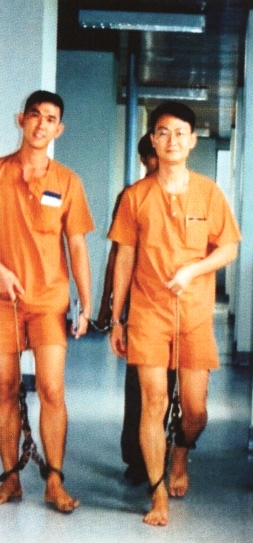
Lek
Thaveetermsakul and Somyot Pipat on their way to a court hearing
during their time of incarceration
On June 26, 1991, eight of our Thai church members were arrested, charged with treason and imprisoned. They were not released on bail until March 1993. Despite their having won acquittal in the original trial and in a trial in the court of appeal, twenty years after their arrest they faced final judgment case in the Supreme Court of Thailand. As was reported in our last issue, on September 1, the ordeal ended when the Supreme Court announced it agreed with the two lower court acquittals. The eight members could breathe freely for the first time in more than two decades. Lek Thaveetermsakul (trained as a medical doctor, he is known affectionately as Dr. Lek) and his wife Vipa Thaveetermsakul, who is from Taiwan, were among the eight. Here is Dr. Lek's story of how God has worked in Thailand during the ongoing ordeal.
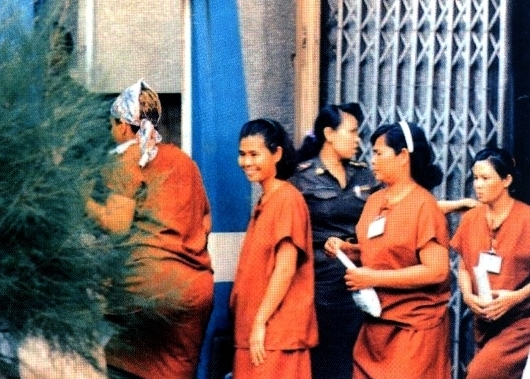
Dr.
Lek's wife Vipa at the women's prison where she endured separation
from her husband and the other members.
Question: How certain were you of victory in the Supreme Court hearing on September 1?
Even though we expected to win the case, there was always some fear, some lingering doubt among the defendants. We had gone through twelve years of very serious work, fighting to build a strong case, knowing that we might have to take it to appeal or even to the Supreme Court. I had worked on it during those years and I felt our case was very strong. The Supreme Court is dealing only with points of law, not the facts of the case as such, so we knew it was not a matter of additional evidence being brought in. There is always uncertainty as to what is going on behind the scenes, but internally I absolutely believed that we would win at the end, and that it was only a matter of time.
Question: You could have been given the death penalty.
At the time of our arrest, the chief of police had wanted us tried for treason by a military tribunal under martial law. We could have been executed within twenty-four hours had that happened and had we been found guilty.
As you can see in other reports that are circulating, a daily newspaper had attacked us and in the end we responded by bringing a court action against the newspaper. But the newspaper had a cozy relationship with certain factions in the police force, and the police raided us and brought criminal charges, accusing us of betraying our country and seeking to make it a colony of Korea. The charges carried a maximum penalty of death.
Question: You were incarcerated for a long time initially.
From the point of our arrest we were imprisoned during the whole process from the police investigation, to filing of the case with the prosecutors, to the prosecutors bringing the case to the court and to the beginning of the trial itself. The initial trial took twelve years. During that period we had to attend hearings at the court two or three days each month.
If it had not been for clashes in the streets, where rioters shed blood in protest against the military regime in our country, which led to the end of the military government,' we might never have been able to get out on bail. We could have been in prison for much longer than we were.
Question: How did you cope with the knowledge that it might be a long time?
Even though we were in prison, we kept faith. Moreover, our core members also kept faith. The core members supported us by visiting us, and with prayer. Through this strong faith and unity, God could protect us.
We did not die or wither away in prison, as has happened to many people. I knew that if I got seriously ill in prison I would probably die, so I kept myself fit through exercise and lifting weights. I had never done weight training before. I actually put on muscle, and when I left the prison I was ten kilograms heavier than when I went in; but it was muscle, not fat.
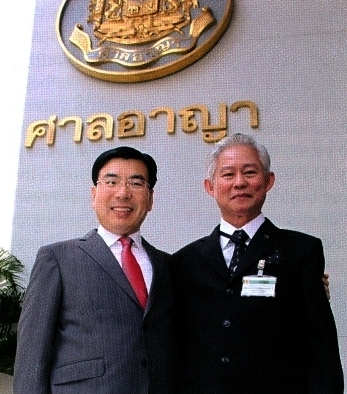
Police
Lieutenant General Thaveesak Tuchinda with Asia UPF director Dr.
Chung Sik Yong outside the courthouse
Question: Were your children fully aware of the situation?
My children first heard about the case quite recently, when they were thirteen or fourteen years old. My wife talked with them. They first heard the full story when I gave a talk about it to a large group of members, and they were present. That was the first time they were able to grasp the situation in full. Although we knew we would win, they were worried. My son came to me and asked if I would have to go to jail. I told him no. But my wife had taken the children aside and spoken with them seriously, preparing their hearts. Although she too knew we must surely win, there is always an element of uncertainty.
On the morning of the final hearing, my son asked me again, "Dad, are you coming back home today?" I said, "Yes, of course. Don't worry." And I said, "Telephone your mother when you finish school in the afternoon."
He didn't wait until after school. Even though children are not allowed to make calls during the daytime, he borrowed a telephone at lunchtime and called his mother as soon as he could. She could tell by his breathing how worried he was as he asked, "Did we win?"
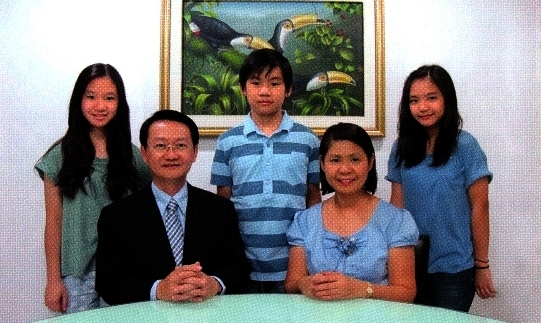
Lek
and Vipa Thaveetermsakul with their children
Question: Twenty years seems unbelievably long for a court case.
In the United States, the prosecution cannot appeal an acquittal in a criminal case, as this would place the accused in "double jeopardy." But in Thailand, prosecutors can appeal against an acquittal. We had been charged with treason. Prosecutors wanted to prove themselves and were thus willing to push it on and on without regard for the time it took. It was a criminal case.
If a prosecutor loses twice, in the first trial and at the court of appeal, the government cannot pursue it further; that is, to the Supreme Court, unless the judge has some doubt on the application of law, or unless the prosecutor can persuade the attorney general to endorse a final appeal to the Supreme Court. Our case was handled by a group of prosecutors who themselves appealed to the attorney general, the nation's top prosecutor. He endorsed the case because it was a matter of national security. In fact, our case was a major case in our country.
The case formally began on June 26, 1991, so it should have lapsed on June 26, 2011, after twenty years. That meant that on June 26, 2011, the charges would be dropped against those who had been charged in the case, but not been arrested and put on trial (True Parents, and some other leaders).
Police Lieutenant General Thaveesak Tuchinda recently became an Ambassador for Peace. He comes from a well-known and wealthy family which has many medical doctors and famous lawyers. I told him about our case and asked him to check if the charges would actually expire on June 26, 2011 for True Parents, and also to check the progress of our case in the Supreme Court. It is extremely hard to find out the status of a case in progress at this level.
Only someone in the right position could find the way. So in June, Lieutenant General Tuchinda contacted the court secretary, who could check the progress of the case. He testified to the secretary that he could see no danger posed by our movement to the nation; that, moreover, the movement had been doing good things for students, young people, women, the poor, and so forth; and that the case needed to be concluded as soon as possible, since it has been going on for so long. Not long afterward, we received notification that the hearing would be on September 1.
Could you have been sent back to prison after all this time? If the court had returned a conviction against us, we could have received long prison sentences because of the severity of the charges. As you may have heard, handcuffs were brought into the court before the judge entered to read the court judgment. The judge who reads the court decision, by the way, does not know what it says. The decision of the judges on the case is in an official, sealed envelope.
My wife asked me to hold her hand. She was still worried about which way the decision would go. Although we knew this day would one day come, facing it in reality was not easy. Apart from the time we met when we were brought into court for a hearing after having been incarcerated in separate prisons for many months, this final courtroom hearing on September 1, was the only time that I had seen my wife in tears.
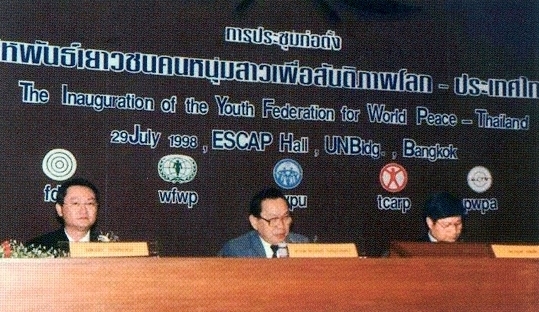
The
Youth Federation for World Peace was one of the organizations
launched while our members' trial was ongoing.
Question: Despite the enduring threat you faced, the Thai movement has grown. How was that achieved?
Soon after we were released on bail, our lawyer told us that it would be best if I go away to the countryside and keep very quiet for a time. But I told the lawyer that I could not do that. I said we had to move forward, but that I would be sensitive and reasonable in what I was doing and I would inform him of whatever I was going to do.
So we reestablished the Professors World Peace Academy (PWPA) activities, and with the International Conference on World Peace (ICWP) in Bangkok in 1993, the professors, who were our VIPs, began coming back. They thought we were dead, but we did not die. We resurrected the organization and, one by one, they returned.
With the help of the former Supreme Commander in Chief of the Royal Thai Army, General Saiyud Kerdphol, we set up the Foundation for Development and Peace for the purpose of protecting our movement and activities. I asked him to become the chairperson in order to protect PWPA because it was also under attack. At that time, the police were accusing us of brainwashing not only university students but even the university professors! Professors who joined our conferences, or our movement, were being investigated. We then had to reactivate our members, begin quietly witnessing again and restore the financial foundation.
Father launched the Women's Federation for World Peace (WFWP) in 1992, so we also initiated WFWP and began building up its activities. True Mother began to do speaking tours.... True Parents did many world speaking tours but were never been able to come to Thailand. Whenever we went to meet Father and Mother, I felt so ashamed in front of them. We put True Parents on trial and they could not be vindicated for so long.
So, although True Mother could not come to Thailand, we organized a Women's Federation rally by ourselves. Twelve hundred people attended.
Based on that, we gradually reactivated CARP activities. WFWP and CARP were cooperating like mother and son. WFWP helped to open the way in the universities, and CARP could then begin doing activities. Archangel-mother-son cooperation.
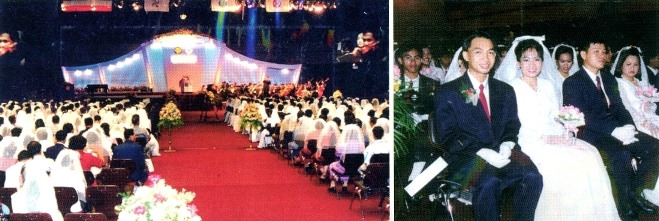
The
Blessing Ceremony organized by the Thai church in 1997, while the
nation's government sought to convict its leaders of treason.
Question: PWPA, WFWP, CARP -- I see...
In that way, we could break through in the schools and universities again. Finally, we brought university presidents on a PWPA tour to Korea and even to America to see our movement in those countries. It was as if we were restoring a significant milestone that had happened just before our arrest. In April 1991, one month before our arrests, we had organized a PWPA tour to Japan. Among the participants were many university presidents. One of them was the president of Ramkhamhaeng University, where the 1988 CARP Convention was held. Fortunately, he was on the civilian advisory board that the military government had established. He was one of a number of board members who strongly advised the government that this case should not be heard by a military tribunal. Satan had wanted to kill us through martial law, but he could not. Then, in prison, Satan could not kill us either -- after twenty-one months, we were liberated. Next, in the court, over twelve years, they wanted to silence us and have us wither away. During this process, while the church was in court, we were building up our movement. Fortunately, because of True Parents' grace and victory, a new way opened up. They established the Women's Federation and then the Family Federation for World Peace and Unification. Based on the success of PWPA, WFWP and CARP,
I decided that there was a foundation upon which the parent organization could come -- that is, the Family Federation. So when True Parents established the Family Federation, we did as well, in 1997. Then, through the Family Federation, we successfully held a major Blessing Ceremony and True Parents even appeared on television. We had advertised the Washington DC Blessing Ceremony on television. We held our event simultaneously at night, with the use of satellite broadcast.
For ten years after we lost our first son through a miscarriage, my wife and I had not conceived any children. We had almost lost hope. Then just when we decided to establish the Family Federation, she became pregnant. During the time we were establishing FFWPU, my wife's pregnancy took a serious turn and she had to enter the hospital. She was in intensive care for almost two months. It was a balancing act between the baby's life and it's mother's. Just after the Family Federation was established, my wife gave birth to twin daughters safely, thanks to God's protection and members' prayer. We were very grateful because we thought we were too late. We had lost ten years. God returned the time we had lost by giving us twins.
Then, we began the big blessing campaigns. At that time, one member's parent, who strongly persecuted us and worked with the prosecutors to prosecute us again, went to the largest newspaper. We were preparing for the Blessing Ceremony. We were going to use a live television broadcast, challenging such public exposure even while the case was still in court. This member's parent also began personally attacking Mrs. Kamoltip Payakwichien, the president of WFWP in Thailand, who was helping with public relations for the blessing preparations. He used very bad language.
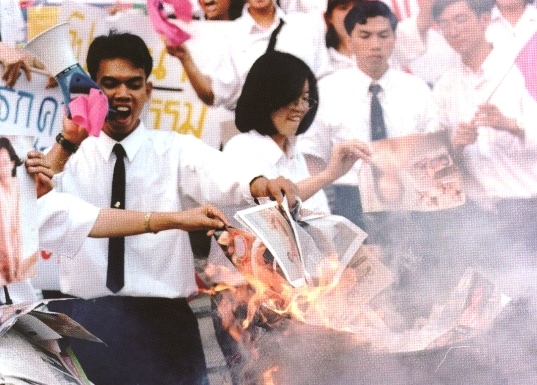
Church-related
groups revived after the release of Thai church leaders. Here, CARP
members demonstrate against the spread of pornography.
Question: In the newspaper?
No. Calling her at home. Because she was helping me, doing public relations for our movement. He threatened us saying, "The day you hold the blessing, you will go to jail; the police will take you to jail." Because the largest newspaper began to write bad things about us, the Bangkok governor, who was going to be the chairperson for the event, backed down. Kamoltip asked her husband's younger brother, who was the governor of the Thailand Tourism Authority, to take his place. Yet we were still under the threat of a police raid on our Blessing Ceremony.
Question: Were you worried that the police would actually come in?
Yes, of course we were worried, both Kamoltip and I. We had sent the other VIPs to join the main Blessing Ceremony in Washington DC. Only she and I remained. She dressed very nicely and carried a small purse with her bankbook in it, so that she could bail herself out if arrested. It was the weekend. If you don't have cash and haven't prepared, you could end up in jail for two days. She was that serious, and that prepared.
The Blessing Ceremony was so beautiful. We had married couples that took part in it, who had come from all over the country -- government officers in nice clothing, movie stars and other celebrities -- there was no justification for legal action.
We explained to the newspaper that what they were doing was wrong. Kamoltip's husband publishes two big newspapers. They move in media circles and had heard the rumor of a proposed attack on us during the Blessing Ceremony to destroy the event, and that the radio stations were forewarned to be ready for that breaking news. People in the media came to know about Kamoltip's media background, so they did not want to cooperate with the biggest newspaper's plan. We also prepared by having members who knew Wonhwa-do martial arts guard the venue.
But there was no way they could take action against us! Thousands of people participated and all the newspapers put it on the front page the next day. Even the biggest newspaper was silent. We won a great victory. While our case was in court, True Parents were shown on television giving the blessing. That was historic, a turning point for our movement's image. After that, lawyers, engineers, even doctors called and wanted to attend the blessing because we had advertised it.
In 1998, we held another successful Blessing Ceremony, sponsored by the Community Development Department of the Ministry of the Interior. We set up a program with this government department to help strengthen marriage and the family. We gave holy wine to people throughout the nation. We chose exemplary couples from all over the nation to be part of our Blessing Ceremony. It was televised. I went to Alaska and reported about this to True Parents. They were so delighted.
Later, we also inaugurated the Youth Federation for World Peace in Bangkok's UNESCAP Hall in July 1998. Through YFWP we extended the Pure Love Movement and the blessing to students and young people in 412 high schools, involving about 400,000 students throughout the nation.
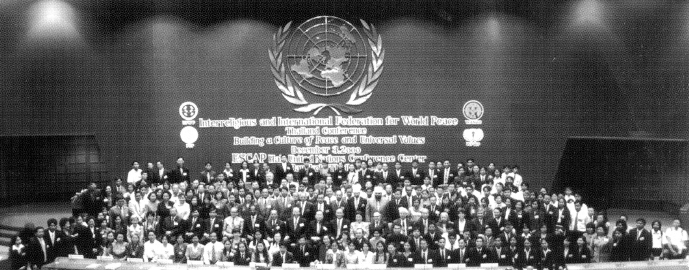
An
International and Inter-religious Federation for World Peace
conference at the UN Conference Center in Bangkok, December 2000; Dr.
Lek and the Thai members did their best to serve their nation and
region while under duress.
Question: Did the success in these Blessing Ceremonies help end the opposition?
Well we became so well known that another attack came, in 1999. This time it was from ITV news television, which was the most powerful medium at that time. They scrutinized our movement and presented their findings as a scoop. Even my picture appeared on television. "This person, whose national security case is ongoing, is connected with this Family Federation."
We had to fight back. They weren't willing to stop. An hour-long program was broadcast. They wanted to destroy our image, which we had built up beautifully. So, I asked General Saiyud Kerdphol if he would write them a letter telling them to stop because, for one thing, our case was in the court and the process of justice was ongoing. "Why are you intervening in the process of justice? You are interfering with the court's jurisdiction. If you continue to do so, we will take legal action." Finally, they fell silent.
That television station was a rising star. Yet shortly after this incident, it fell into internal struggles that demolished their organization. It disappeared. It was like judgment.
Question: So you continued moving forward.
After that, we restructured again. We had many organizations such as WFWP, FFWPU, YFWP and PWPA, but all loosely formed without registration. Our VIP's advised us that we needed a strong legal foundation to protect ourselves. So, by the end of 1999, we restructured all our organizations so they were legally incorporated under the umbrella organization of the Foundation for Development and Peace, which had our top VIPs as committee members. We were thus moving to the national level even while the court case continued. I thought we had to go beyond the national level to win on the national level, as Father was doing. In 2000, Father had spoken of the UN-related providence and spoken at the UN. That was his strategy and that's why I sought to connect to the UN.
From there, we began connecting everything to the UN. We held many conferences such as PWPA ICWP, the IIFWP inaugural conference, a national YFWP Conference, WFWP and a WANGO conference at the UNESCAP Conference Center in Bangkok; we even brought the Family Federation into the UN for the International Day of Families. We started that project early on -- held it once, twice, three times until finally it was so big that the director of UNESCAP, Mr. Hak Su Kim, arguably the number two man at the UN, personally came to our event. We thus received recognition for our conferences at the UN on the International Day of Families.
Then in 2003, we won the court case and were acquitted of all charges. We had brought Dr. Nicholas Kittrie to Bangkok to testify in our case. We brought many of VIPs who were close to us to testify, too. Towards the end of the trial, we brought even the former Supreme Commander in Chief of the Royal Thai Army, General Saiyud, the former president of the Ramkhamhaeng University, Dr. Pradit Chareonthaithavee, a former senator, professors -- all top-level people -- and they testified on our behalf.
Winning our case was a major breakthrough. But then, the government decided to appeal.
Question: Did you know they would do that?
Yes. But anyway, we just kept building up our movement. We had won the court case and we kept on going. Every day I thought, "When will it finish?" For me, though, since I came out of prison, I never wanted to look back, but just look ahead, whether the case was finished or not. We couldn't just fight the case, we also had to move forward.
The foundation you built up over the years after your release from prison surely influenced the outcome of the case. Actually, I had a personal conversation with Hyung Jin nim and Yeon Ah nim, during their visit to Thailand last year. I shared about Thailand's situation. I told them how we had been fighting in the court because they were accusing us as a strange sect, even one politically motivated like communists. We were trying to defend ourselves by saying (and showing) that we were a genuine religion, and that we had the basic human right of religious freedom; and yet they had not accepted us as a religion.
Our teachings are religious teachings; our motivation is religious motivation. We had no mind to take over the nation for any political reason. That was our basic ground to fight the court case and show our sincere work. How important that is! Without being seen or understood as a genuine religious organization, all of your basic human rights can be taken away.
When the court case began, we tried to get documents, proof that we are a church or religious organization. It was very difficult to show a strong, influential religious foundation to prove that we were a genuine church. Of course, we were registered in America. But that was just a registration. The church foundation in American was under attack; we were still viewed by the media as a bad sect.
The homeland of our faith is Korea. At that time, in Korea, we were also under attack. Many were against our church, even in the founder's homeland. That's why when Hyung Jin nim emphasized that we are a religious organization, I told him I absolutely understood why he was doing that.
I understood that without a strong foundation, we cannot move on. Of course, Father talks about there being no need for religion in the future, but we are not at that point yet. We have to come back to build that foundation. As a general NGO, our movement doesn't have as strong a foundation as a religious organization. So I understood why Hyung Jin nim has tried to do that. Once the Korean church successfully establishes itself, is accepted by the government, incorporated legally, and accepted by society, it will benefit the church in the whole world.
Even though we have come back to being a religion, the level is different. Before we were working on the unity of Christianity but now we should work as a world religion -- Tongilgyo -- for the unity of world religions.
If we are viewed as something other than a genuine faith, as happened in Thailand, we can end up in a serious situation.
I told Hyung Jin nim and Yeon Ah nim how important I felt their work in Korea is. Without that, all our churches in the world will suffer. It's very difficult to be recognized. If we have a strong foundation in Korea -- and in America -- the whole world can turn around.
They are not just thinking about Korea. They are thinking about the providence as a whole.